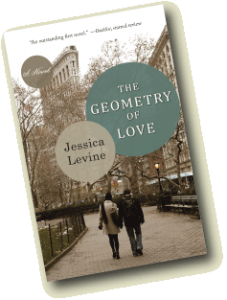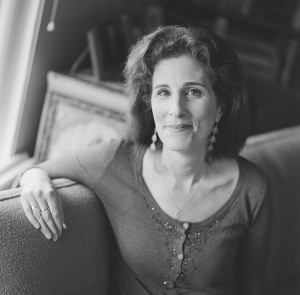 Jessica Levine's The Geometry of Love comes out this week and is already making a splash. Booklist gave it a starred review and called it "an outstanding first novel." As their reviewer explained, the story "charts the love triangle between Julia, Ben, and Michael as all three search for the answers to life’s most heartfelt questions. Spanning 1987 to 2004, the novel’s scope and sweeping character arcs will appeal to fans of Meg Wolitzer’s The Interestings....Julia’s emotions, insecurities, and pleasures are laid bare and recall Isadora Wing in Erica Jong’s Fear of Flying." That's super high praise, indeed, and well deserved. I'm excited to share this brief interview with Jessica about her fine first novel:
VP: I'm always interested in the story behind the story of a debut novel. Is this truly your first completed novel, or, like so many of us, do you have others tucked away in a drawer?
Jessica Levine's The Geometry of Love comes out this week and is already making a splash. Booklist gave it a starred review and called it "an outstanding first novel." As their reviewer explained, the story "charts the love triangle between Julia, Ben, and Michael as all three search for the answers to life’s most heartfelt questions. Spanning 1987 to 2004, the novel’s scope and sweeping character arcs will appeal to fans of Meg Wolitzer’s The Interestings....Julia’s emotions, insecurities, and pleasures are laid bare and recall Isadora Wing in Erica Jong’s Fear of Flying." That's super high praise, indeed, and well deserved. I'm excited to share this brief interview with Jessica about her fine first novel:
VP: I'm always interested in the story behind the story of a debut novel. Is this truly your first completed novel, or, like so many of us, do you have others tucked away in a drawer?
JL: I would say this is my first publishable novel, and yes there were others before it. I wrote a first novel over twenty years ago, then put it in the drawer for a decade while I did my doctorate in English. When I went back to it, I found myself adding new layers to each character and new complications to each plot element. So there's a sense in which The Geometry of Love contains several geological strata beneath it.
VP: How long did it take you to write this book and I'd love to hear about your path to publication?
JL: Because there were many versions over several decades, my simplest answer would be, "A long time. A very long time." The last two rounds took around six years. My agent, April Eberhardt, submitted the novel to dozens of publishers. When they rejected it, she encouraged me to think about publishing with She Writes Press. I went to an information meeting that SWP held about a year ago in Berkeley and was very impressed with the women authors who spoke about their books and their experiences with SWP. The next day I decided to sign on. One of the wonderful things about SWP is that there is a sense of community among the writers that I don't think can be found elsewhere, either in traditional or self-publishing.

VP: I'm curious about your relationship with your literary agent, April Eberhardt. I'm curious how you found each other and if there's anything you'd like to share about how she worked with you on this novel.
JL: I met April in February of 2008, at the "agent speed dating" event hosted by the San Francisco Writers Conference. She requested my manuscript, read it, and gave me some pointed feedback. Although she saw me as "a strong writer," she found that some of the pacing and characterization was "out of the step with the times." (I can quote because I saved her early emails). It was the most honest, painful, and useful criticism I had ever received; it made me realize that I had been too influenced by the literature I'd been steeped in during graduate school: Henry James, Edith Wharton, the French realists. At that point I began implementing some of the lessons I'd learned in studying screenwriting, and I undertook a complete rewrite that aimed for vivid characterization, momentum, and dramatic scenes. I also changed the point of view from the third to the first person.
Three years later, in 2011, I returned to the San Francisco Writers Conference and ran into April who asked to see my manuscript again. She read it, fell in love with it, and asked to represent me. She had reservations about the ending of the story and encouraged me to think about changing it. I wrote a new ending, which we both liked more than the first. I am fortunate in that April is not only a wonderful agent, but also an astute reader.
VP: Your novel spans several decades and takes place in several cities, which makes me wonder where you have lived and if you find that you write about your home city while still there, or if it takes leaving a town to then look back on it and write?
JL: It was Hemingway who suggested he needed to leave places in order to write about them. At the beginning of A Moveable Feast, his memoir of life in Paris, he wrote, "Maybe away from Paris I could write about Paris as in Paris I could write about Michigan." Certainly geographical or temporal distance can help distill the essence of a place; however, personally, I don't find it necessary. The New York in The Geometry of Love is the city I grew up in and lived in again briefly in 1980 and then 1990. However, the second half of the book takes place in Northern California, where I live now. Writing about Berkeley and San Francisco was a way of celebrating this extraordinary place I now call home. In short, unlike Hemingway, I am happy to write about a city, whether it has been a past or a present home.
VP: Without giving too much away about your plot, I think we can say that it's about love coming to fruition after a period of time. Do you think you could have written this book when you were in your twenties, or have there been lessons that life has taught you that you needed to experience first?
JL: I definitely couldn't have written this book when I was in my twenties! For example, with age, I have come to appreciate people who have a broad emotional range and to accept that the more we open ourselves to expressing our positive qualities and emotions, the more we may also find ourselves expressing the negative. In my novel, I explore a related theme that has always fascinated methe way the search for perfection in a mate can create a block to finding love. Julia hesitates to choose Michael, who is passionate and her "muse" artistically, because he can also be depressive and difficult. It takes her a long time to understand that truly inspiring people are frequently "mixed bags." In the process she also develops resilience. This growth is about embracing what Carl Jung called the "shadow" aspect of ourselves and others. Ultimately, loving both the light and dark aspects of another human being helps us love both the light and dark aspects of ourselves.
VP: And finally, any words of wisdom to our readers about the process of writing and the vagaries of publishing? This is a chance to remind us of anything you've learned that will help us keep hope.
JL: I see writing as a place where you can be authentic, perhaps more authentic than anywhere else. Words are extraordinarily precise tools for describing inner and outer worlds and in a novel, you can use your imagination to explore your vision, life experience and obsessions to your heart's content. At the same time, assuming you want to be read, you have to be ready to make adjustments and concessions to your readers. These may be in order for the nuts and bolts of the story to make sense or they may be in order to resonate with a target audience. Throughout the process, the important thing is to circulate your work among readers whose judgment you trust. Writing a book is a little bit like dancing: you take lessons, practice your steps alone at home, but in the end you hope to go to the ball and find partners to dance with.